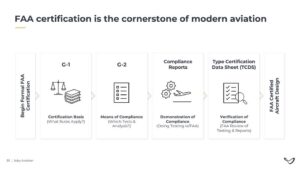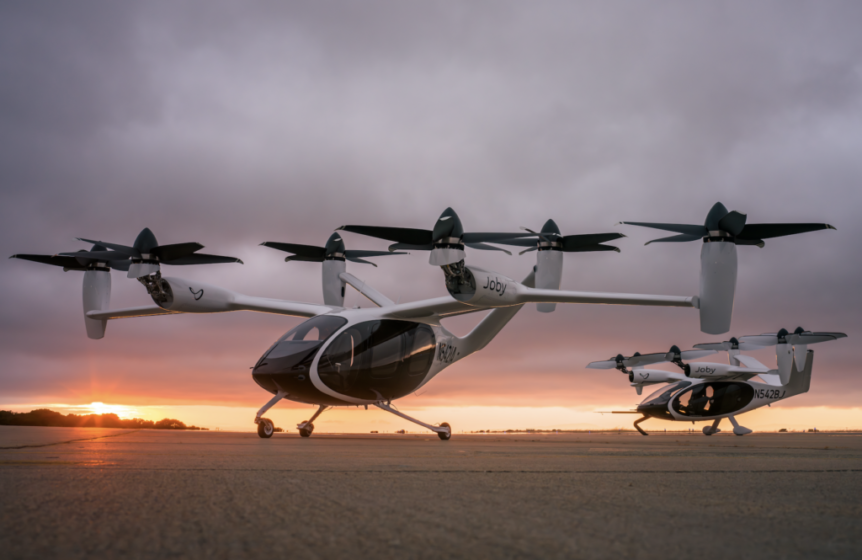“Joby Aviation has received a Federal Aviation Administration Special Airworthiness Certificate for the first aircraft built at its pilot production line in Marina, California, allowing Joby to begin flight testing of its first production prototype” according to Dan Carney’s reporting in Design News.
Having visited the Woodpecker Ridge development site and written about Joby Energy and Joby Aviation since 2010, your editor has seen remarkable progress in the company. JoeBen Bevirt had about a dozen engineers working in his design studio then, and that has steadily grown to around 1,300 employees today spread over several workshops and administrative offices along the central California coastline.
What is This Thing Called, Love?
From the paperwork in the Federal Register detailing Joby’s application for a Notice of proposed airworthiness criteria, Joby Aero, Inc. is asking for guidance on its Model JAS4-1 Powered-Lift.
Since the craft is not described as an airplane, helicopter or with other terminology, the Register includes this note: “The Joby Model JAS4-1 powered-lift proposed airworthiness criteria also include new performance-based criteria consisting of part 23 standards as modified by amendment 23-64. The FAA developed these criteria because no existing standard captures the powered-lift’s transitional flight modes. The proposed criteria also contain definitions specific for a powered-lift, such as flight modes, configurations, speeds, and terminology. Additionally, electric-engine and related propeller airworthiness criteria are proposed. The new requirements specific to the Joby Model JAS4-1 use a “JS4.xxxx” section-numbering scheme.”
Defining and Meeting the Criteria
Baker McKenzie, an international law firm, helps define the criteria eVTOLs are expected to meet and provides insight into the complex means necessary to meet them. They provide insights into the regulatory landscape required for these craft to become commercially available.
“For eVTOLs to be deployed commercially at scale, three core aviation regulatory approvals will be required in most jurisdictions: type certification, production certification, and operational authorities. Type certifications are the regulatory approval of the airworthiness of a particular manufacturing design (type design), and are the first step for commercialization of any eVTOL. Many companies are currently in this phase of their business plans, as they design their eVTOL aircraft and pursue a type certificate. Production certification will allow mass production of a particular eVTOL and is granted when a manufacturer can demonstrate that it can produce aircraft that will meet the standards of a type certificate. Finally, to operate eVTOLs commercially by transporting passengers or cargo, additional operational requirements and authorizations for commercial operations are required.”
Where Joby is in the Process
The FAA uses the certification process to enforce the step-by-step process required for safe operation of aerial vehicles.
First, they require paperwork setting out the approach and methods to be used in determining compliance with the rules. “Certification basis (G-1) issue papers designate the applicable airworthiness and environmental regulations (noise and environmental findings), including special conditions, that must be met for certification as stated in 14 CFR §§ 21.17, 21.21, 21.25, 21.27, 21.29, or 21.101, as applicable. It also designates applicable Special Federal Aviation Regulations (SFARs), and records any exemptions granted (see 14 CFR § 11.25)”
After being granted that set of stipulated goals, Joby has managed to go through four of the five stages required to demonstrate compliance with those goals, including meeting those all-important noise and environmental standards.
In December 2022, Joby was the first eVTOL firm to complete stage one, Conceptual Design. In February 2023, they completed the Requirements Definition stage of the process. Compliance Planning, the third stage, specifies the tests, analyses, and reports by which Joby intends to demonstrate its design’s compliance with applicable regulations as defined in the Requirements Definition stage.
As certification proceeded, Joby sent its shareholders a reminder that the process has some flexibility.

“It is typical for a small portion of the Means of Compliance to remain open to allow for further collaboration on minor design changes and improvements that may occur later in the certification process. With 94% of our Means of Compliance now accepted by the FAA, Joby considers the second stage essentially complete.”
Now in the fourth stage, Implementation, Joby is flying its first production line-built machine on a Special Airworthiness Certificate.
As noted in the video, Joby is working with the Department of Defense (DOD) and AFWERX, an Air Force development group. Such further testing, even beyond the fifth stage of FAA certification, will probe the characteristics and possibilities of this machine. Best wishes to JoeBen and his remarkable company.
The Stock Market Follows
Joby stock jumped 26 percent to $8.04 a share on the morning of the certification announcement. The stock closed at $10.56 a share today (July 13).
An Environmental Update
AVWeb just reported (July 14) that Joby has released its first environmental, social, and governance, giving some insight into how electric aviation may affect these real concerns. Read the 49-page report here.

